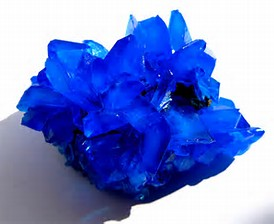#CuSO_4(s)# is a white solid, that is composed of #Cu^(2+)#, and #SO_4^(2-)# ions, bound together by strong electrostatic forces that exist between oppositely charged ions. #SO_4^(2-)# is a charged species, an ion that we could represent as #(O=)_2S(-O^(-))_2# (of course all the oxygen atoms are equivalent). With me?
Within the sulfate ion, there is a strong degree of covalency. The overall charge on this covalently bound species is #-2#; and hence is forms a salt with #Cu^(2+)# to give the required #CuSO_4#.
Place WHITE #CuSO_4# in water, and you see the colour change to give a beautiful blue due to #[Cu(OH_2)_6]^(2+)# or a variant. The beautiful crystals that you see in the diagram are due to #[Cu(OH_2)_5]^(2+)SO_4^(2-)*H_2O#, so-called #"blue vitriol"#.
 )
)
 )
) 
